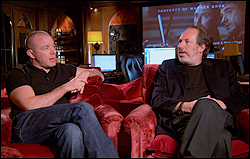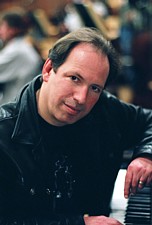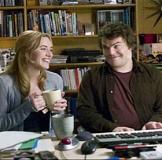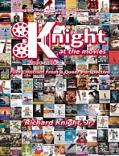
Zimmer at the piano, discussing the Sherlock Holmes score with director Guy Ritchie, Kate Winslet
and Jack Black as a comedic film composer in The Holiday
and Jack Black as a comedic film composer in The Holiday
film from a queer perspective
Interview
| KATM media outlets |
| KATM featured weekly |
| Join Us! |
| KATM on RT |
| Vidcast Starring KATM |
| NOTE: THIS SITE ONLY LOADS CORRECTLY WITH EXPLORER AND MOZILLA BROWSERS - SORRY SAFARI USERS! |
| Buy the KATM Book |
Hans Zimmer Scores...Everything
Expanded Edition of 3-5-10 Chicago Tribune Interview
By Richard Knight, Jr.
Expanded Edition of 3-5-10 Chicago Tribune Interview
By Richard Knight, Jr.
| NOTE: This interview was conducted in conjunction with my latest Chicago Tribune soundtrack roundup which ended up, due to space considerations, focusing strictly on the 2010 Oscar nominated scores. The bulk of my interview with Zimmer also had to be cut. Here’s most of what got left on the cutting room floor. Hans Zimmer is one of the busiest film composers in Hollywood (over 100 scores and counting). Between his own scores and those he collaborates on (everything from the “Batman” and “Pirates of the Caribbean” blockbusters to rom-coms like “It’s Complicated”), the German born musician who has been nominated for eight Oscars also has the distinction of being included in a rare reference to movie music within a movie. The scene occurs in Nancy Meyers’ comedy “The Holiday” when Kate Winslet and Jack Black, portraying a film composer, enter a video store and Black’s character recommends several different DVDs based solely on their memorable music themes, humming them to hilarious effect. Among these is Zimmer’s “Driving Miss Daisy.” “It’s the best guilty pleasure you can have without clogging up your arteries,” the composer said with a laugh, momentarily interrupting work on “Inception,” a new collaboration with director Christopher Nolan. But Zimmer – a ruthless perfectionist who cites Ennio Morricone as an inspiration – remembers his Oscar winning moment in 1994 for “The Lion King” with less pleasure. “I thought it was gauche and full of hubris to prepare a speech. I had nothing prepared and I forget to thank my mother and she's never, never forgiven me for it,” the composer relayed, “Look, I was off that stage before they started playing the music.” Nominated again this year for his memorable, driving score for “Sherlock Holmes,” Zimmer will have an acceptance speech ready should his name be called Sunday night when the Academy Awards are presented. “I suppose I’m just a little more grown up these days so now I think, “Go and write the speech, don’t be sheepish.” KATM: Congratulations on your Oscar nomination. We have to start there I think. HANS ZIMMER (HZ): Well thank you. It’s sort of a mind numbing event (laughs). It’s every exciting. Thank you. KATM: What was your approach to the music for “Sherlock Holmes?” What makes it stand out from your other scores? HZ: A few particular instruments that I used that I think are different from your normal Warner Bros. Christmas movie release. To even smuggle a banjo into the thing was, I think, quite different, and certainly the out of tune pianos and accordions. I was imagining the whole thing much more in the Kurt Weill-Brecht Victorian London than what we had grown up with for the Sherlock Holmes movies and the character of Sherlock Holmes itself. KATM: And where did that inspiration come from? HZ: Partly Guy Ritchie, partly Robert Downey, Jr. and partly just being German I suppose. And partly just seeing who I thought the character was. I think – and it’s very much how Robert Downey plays him – I keep thinking of Sherlock as not only a manic-depressive violin player but also it was the Victorian age and the Empire was there. People were thinking outside London; the world was suddenly a larger place and the exoticness of foreigners was interesting. I thought Sherlock Holmes having an inquisitive mind it would be interesting if he didn’t just play Bach and Beethoven and Elgar. Why couldn’t he find joy in playing Hungarian gypsy music or Irish fiddle music? And that was really my jumping off point. It was also the way the movie looked – you imagine a pub at every corner. I think there’s a fabulously evocative sound to the Hungarian cimbalom (a hammered dulcimer) and my excuse was always going to be – whenever I had to go and defend it to the producers or the studio – was, “Well, it worked for “The Third Man,” didn’t it?” KATM: There you go (laughs). Put the zither right on the map. HZ: Yes. I kept thinking to myself, “Wouldn’t it be great to pit the humble banjo against the might of a symphonic orchestra?” because in a peculiar way the look of the movie is really opulent – the design is gorgeous and rich and all those things – and I felt the music needed to be a counterpoint. Plus, I needed whimsy. KATM: And that spritely sound comes across. Now you talk about being prepared to defend your choices. That’s so common in your profession which I don’t think the average moviegoer is aware of – scores are many times rejected. HZ: (sighs) I know. It kills you to have to go in and defend the music. But here’s the bottom line of the job. The job is you’re supposed to deliver something unexpected which automatically puts you slightly outside the zeitgeist of what everybody expects so you know that they – whoever “they” are will take a little bit of time to get familiar or used to the idea even. What they ask of me is, “Do something new” but really what they would like is what I did last year. KATM: Speaking of “The Dark Knight” you’re also a big proponent of the collaborative music score. I know you collaborated with James Newton Howard on that and you’ve collaborated on the Nancy Meyers pictures and on other things. Is that because you just love all different kinds of music and want someone to bring in their area of creative expertise or is it that the job is so large, you divvy it up with another composer? HZ: There’s a little bit of both. First of all, take James Newton Howard. He’s a friend; I admire him; I love what he does and I love the conversations we have about music. These things add to the tapestry – it adds to the tone to have another great musician in there. My ego is fairly intact – I don't get threatened easily and in fact, I welcome other people’s ideas. I’ll take them from wherever I can get them. And there’s a great joy in being able to play music with other people. It might be sitting at the piano and playing four handed as James and I have done often or it’s just a conversation where the ideas and the improvisations start popping up. KATM: So was it a delight to watch “The Holiday” and have the character of Jack Black – a film composer – start singing the theme from “Driving Miss Daisy” in the scene in the video store with Kate Winslet? HZ: Of course it was! Of course it was! It’s a one hundred percent guilty pleasure right there. It’s the best guilty pleasure you can have without clogging up your arteries I suppose. KATM: Did you know in advance that that scene was in the picture? HZ: Yes. I knew and Jack Black would come down and sit there and watch me compose and then I got the shots – the opening scene – back and it was really strange because the set designers had sort of copied my set up so it was like a hall of mirrors type of effect where I’m sitting there watching somebody else sitting there in front of my equipment and doing my job except I haven’t written it (laughs). KATM: In some ways, that had to be better than an Oscar. How many movies feature a scene where a film composer goes into a video store and starts singing great movie themes and includes your own? HZ: It was great; it was great. And both Nancy (director Nancy Meyers) and I made sure that our hero Ennio Morricone gets mentioned a lot in the movie as well. KATM: Can we talk about some of your personal favorites among your own film scores. Do you have some? HZ: Tricky territory. It’s whatever the last thing you’ve done plus somewhere in your murky past there is something else that your head keeps going to and you think, “Mmmm, that was okay.” I suppose, quite honestly, “Thin Red Line” was pretty good. It’s really tough for me to say. I try not to let anything ever leave my room unless I can…I can’t say I’m happy with it but maybe I got rid of the most offending things. There are a thousand ideas in there and I just try to take out as many of the bad ones as possible. Then I go, “Okay, it’s alright.” KATM: Well, what about some of your favorite scores or composers? HZ: There is very little that Ennio Morricone has done that in one way or the other that I don’t love. Randy Newman’s score for “Avalon” I think is one of the greatest score ever. KATM: Beautiful score, I heartily agree. HZ: Just gorgeous. I really like Jonny Greenwood’s score for “Let There Be Blood” because it was so interesting and so audacious. I just loved it. I’m riffing off the top of my head here. I like what Jon Brion does very much. I really didn’t like the movie “I Heart Huckabees” but what an amazing score. To be honest, what kept me going through the movie was the score in the best possible way. KATM: I’m assuming you agree that a great score should be a stand alone listening experience, outside of the film, correct? HZ: I think so and I really, really, really work hard on that. That’s what I was trying to do with “Sherlock Holmes.” I was trying to be another character in the movie. I wasn’t trying to hide out; I wasn’t trying to be shy about it and that’s what Guy wanted me to do as well. It’s rare that you get a whole sound effects department coming to your scoring session. KATM: That’s in the tradition of Bernard Herrmann bringing in the ancient or offbeat instruments or sound effects or the Theremin for “The Day the Earth Stood Still.” HZ: Okay, well Bernard Herrmann is in a class so of his own, you know what I mean? You’re asking me about other people’s work and I always get stuck with Bernard Herrmann because there’s so much of it and all of it is based on ideas. The concepts are so solid; the intellectual arc of the whole thing is always so brilliant as well. I think not only incredibly gifted musically but the thought process behind all of his work is always very interesting. KATM: So…when you win the Oscar (we both laugh), what’s your acceptance speech going to be? HZ: I have no idea. You know, all those years ago when I won for “Lion King” I thought it was gauche and full of hubris to go and prepare a speech; I had nothing prepared and I forget to thank my mother and she’s never, never forgiven me for it. It didn’t matter how often I said to her, “Mom, I was really nervous.” Look, I was off that stage before they started playing the music (laughs). I suppose I’m just a little more grown up these days so now I think, “Go and write the speech, don’t be sheepish.” (laughs) |






